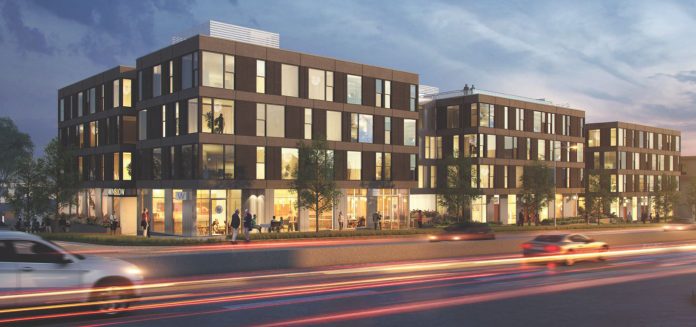
Seattle Councilmember Tammy Morales is seeking to add $70 million in social housing funding to Mayor Jenny Durkan’s budget via two budget amendments. Meanwhile, Councilmember Kshama Sawant’s amendment would add $13 million to the city’s Green New Deal low-income home heat conversion program.
The Solidarity Budget coalition is backing all three amendments as they get closer to the group’s goals of exceeding half a billion in housing investment next year and ramping up implementation of the Seattle Green New Deal. They also are backing the extra $30 million proposed for the Equitable Development Initiative.
“Seattle has a severe shortage of affordable and deeply affordable housing,” Transit Riders Union general secretary Katie Wilson said on behalf of the Solidarity Budget. “Without dramatically scaling up non-market housing, we can’t effectively tackle the homelessness crisis or create the conditions for lower-income families to thrive in Seattle.”
Buoyed by federal and JumpStart funding, the Mayor’s budget already included about $200 million for affordable housing. However, the City Council’s spending plan had tabbed 62% of JumpStart revenue — which is projected to be $235 million in all next year — for social housing, and the Mayor failed to reach that level. Council reaffirmed its spend plan with guardrail legislation passed unanimously this summer, which did allow the Mayor to use $85 million in JumpStart revenue to close a City budget shortfall caused by the Covid recession (the shortfall was defined from the budget-wide baseline taken before the pandemic).
However the Mayor went beyond that and swiped another $52 million in JumpStart housing funds and replaced it with one-time federal funds, which sets up a fiscal cliff the following year for housing investment. The Morales amendments would increase the housing budget, but a Mosqueda amendment is also in the works to restore the $52 million swiped from the JumpStart spending plan and avoid the fiscal cliff the Mayor is setting up.
Specifically Morales’ amendments put $45 million into social housing acquisition and $25 million to a Tenant Opportunity to Purchase fund aimed at helping tenants band together to buy their building if it goes up for sale. These spending areas are a bit different than the JumpStart spend plan, which set aside 82% of housing funds for extremely low-income housing serving those making less than 30% of area median income. Morales hasn’t said where the funding for those amendments is coming from, but she did say she has a pay-for planned that she will announce soon. Together the Council amendments may end up pushing the City’s social housing investment next year past $300 million, depending what gives incorporated into the final budget.
Housing Amendments
In total, Councilmembers Morales, Sawant, Andrew Lewis, Lisa Herbold, Teresa Mosqueda, and Debora Juarez proposed 10 amendments to the Seattle Office of Housing (OH) budget. The budget committee will review the housing amendments at 9:30am session Wednesday and is taking public comment to start the meeting. Sign up opens at 7:30am.
The housing amendments are as follows:
- Lewis amendment adds $200,000 of fund balance in OH to fund the Home and Hope program.
- Morales amendment adds $45 million general funds [GF] to OH for a Social Housing Acquisition Fund.
- Morales amendment adds $25 million GF to OH for a Tenant Opportunity to Purchase Fund.
- Mosqueda amendment requests that SDCI Report on the Notice of Intent to Sell Policy and Program Development.
- Herbold amendment adds $1.5 million GF to OH for services and capacity funding for non-permanent supportive housing providers.
- Herbold amendment adds $200,000 GF to OH for the Home for Good Program.
- Juarez amendment adds $1 million GF to OH for pre-development costs for an affordable housing project at North Seattle College.
- Sawant amendment adds $13 million GF to OH to support Green New Deal programs such as OH’s Heat Conversion Program.
- Sawant amendment adds $2.8 million GF to OH to fund operations and maintenance costs for new permanently affordable housing projects serving homeless households.
- Mosqueda amendment requests “that funding decisions for OH’s Fall 2021 Notice of Funding Availability (NOFA) recognize 2022 affordable housing appropriations and request that OH recommend modifications to the Housing Funding Policies.”
Homelessness, Parks, & SPD Amendments
Also on the docket Wednesday is Homelessness Response, Seattle Parks, Seattle Police Department (SPD), the Community Safety and Communications Center.
Councilmember Juarez’s $3.1 million add to the Clean City Initiative extending it through the end of 2022 is the biggest among 14 Parks amendments. Mosqueda and Pedersen cosponsored the amendment, which is focused on cleaning up litter in parks and open spaces.
Not to be outdone, Councilmembers had 15 amendments to the Homelessness Response budget. The biggest ticket item there was a $19.4 million add by Lewis to operate a 150-bed high-acuity homeless shelter with “intensive staffing that would include a psychiatric nurse practitioner, a primary care doctor, and three registered nurses.”
The SPD budget got seven amendments, including a heavy dose of provisos attempting to rein in the agency and require it follow through on City directives. Public Safety Chair Herbold has proposed cutting $1.09 million in hiring incentives from the Mayor’s proposed budget and cutting $4.53 million from SPD for sworn salary savings, suggesting the Mayor’s plan to hire 125 sworn officers may be in doubt.
Update: This article was updated on October 28th to add further explanation to the JumpStart situation and note the additional amendment planned to restore JumpStart housing funds to their original spend plan and clarify Morales’ amendments will likely not rely on JumpStart funds.
Doug Trumm is publisher of The Urbanist. An Urbanist writer since 2015, he dreams of pedestrian streets, bus lanes, and a mass-timber building spree to end our housing crisis. He graduated from the Evans School of Public Policy and Governance at the University of Washington in 2019. He lives in Seattle's Fremont neighborhood and loves to explore the city by foot and by bike.

